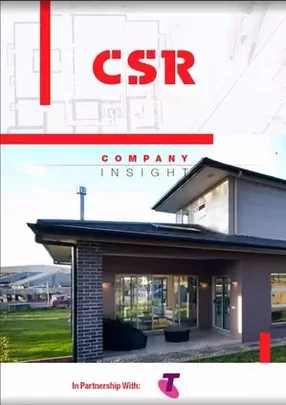Australia’s foremost building products company, CSR, is strengthening its name in the industry with sector-leading technological advancements and a dedication to the community and the planet
A ubiquitous name in the Australian building products industry, CSR sprung from the humble beginnings of raw sugar refinery in 1855, and steadily became the name behind some of the biggest brands in the business. It ranks 96th in the ASX 100, boasting a selection of partners that includes Gyprock plasterboard, Bradford insulation, Monier roof tiles, and PGH bricks, as well as a thriving property portfolio.
CSR prides itself on its high levels of research and development which have led to many innovative and eco-friendly products, such as energy-efficient Viridian glass, and lightweight Hebel concrete. Additionally, the company’s property division develops surplus former manufacturing sites and industrial land and sells it, as well as being part of a joint venture in the Tomago aluminium smelter in New South Wales.
Sustainability
Each year since 2008, CSR has cemented its dedication to a better environment with a sustainability report, and the latest incarnation of this (2016) gives an overview of the most recent achievements in this area, as well as details of its progress towards the 2020 goal of a 20 percent reduction in energy, waste, and water usage per ton of saleable product since 2009/2010.
Reducing its impact on the environment is a top priority, and part of CSR’s research and development work is about analysing its products to figure out exactly how they impact the world, from design all the way to manufacture. Waste production is stringently monitored, everything that can be recycled is recycled, and waste-to-landfill volumes are constantly being reduced. The Sustainability Report contains all of the measures CSR has undertaken to achieve its environmental goals.
The human touch
Last year, the number of lost time injuries per million hours decreased by 20 percent compared with 2015, showing a huge improvement in safety. This could be due in part to an increase in training; 22,070 hours of leadership and training programs were completed last year, which is an increase of 36 percent on the previous year. The business and its employees have also contributed $105,816 to charities as well as donating 655 hours of community support, and continued the CSR Values Champions recognition scheme to reward staff. Clearly, this business gives as much as it can to its home nation, and shines a specific spotlight on its own family of employees.
As a company, CSR benefits from working so hard to improve the local community by developing a positive reputation and being able to hire talented people who trust in the business. It manages safety and health, plus environment and community responsibilities with aplomb, ensuring it retains its status as a high-performing organisation.
Employees are further encouraged to actively participate in community endeavors thanks to the CSR Community Support Program, which is an initiative that allows staff to receive a tax deduction if they donate to charity through the company payroll. This is how the business engages staff to develop and properly represent the CSR brand; the company has much to be proud of in the way it affects its surroundings.
Technology
From a business perspective, CSR’s key focus is on the customer, and making everything as easy as possible for that customer. CSR was the first in its industry to create an online portal for customers, called The Tradie Portal, offering excellent functionality with a myriad of features. Customers can retrieve order quotes, view real-time tracking for deliveries, make online payments, and view their financial statements. It draws the client into the supply chain process, enabling them to feel like part of the extended CSR family, thus solidifying business relationships.
CSR was able to create the required platform relatively quickly thanks to the high levels of technology at its disposal, and disruptive technologies like the cloud. The arduous process of developing infrastructure is removed, allowing customers to utilise the portal very quickly. The business still had to move at speed in its development, which CSR discovered during the testing and feedback process, until the portal was tailored enough to become absolutely essential to the client.
The portal was placed at the centre of CSR’s strategic thinking, and came out on the other side of development as a fully-formed bespoke offering that broke the mould. While the internal feedback began as something skeptical due to the business’s traditional history, the customers’ viewpoint won out, and the The Tradie Portal has become a huge point of CSR’s recent success. Data is now a strategic asset, and while the human element remains and is cherished, less positive elements of tradition have been left behind.
CSR has achieved its admirable success by virtue of being as nimble as a market entrant with a lean, entrepreneurial approach, while maintaining an industry-leading position. It understands customer needs rather than simply supplying products, taking the time to get close to clients and prove that the company understands them. It’s no surprise, then, that customers are attracted and retained, and that CSR dominates the industry across Australia and New Zealand.
- London Pioneers Sustainable Urban Heating InitiativeSustainability & Green Building
- Aggreko: Construction Working Towards Net Zero GoalsConstruction Projects
- Deloitte: Green Steel is Scope 3 Answer for ConstructionSustainability & Green Building
- CTP Embarks on Sustainable Pharmacy Hub in CzechConstruction Projects


